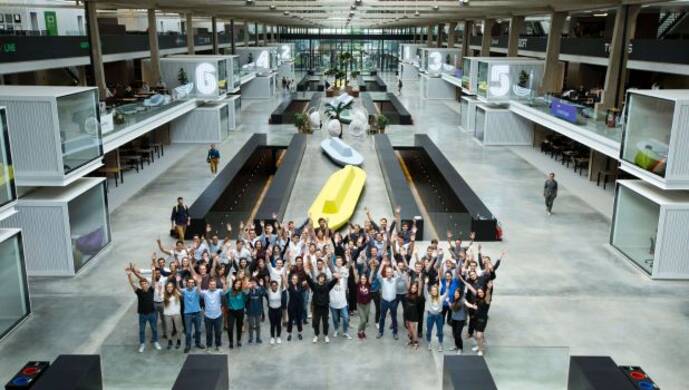Between 2020 and 2021, Villegas-Mateos conducted a series of in-depth interviews with a broad sample of Qatari entrepreneurs working predominantly in digital technologies. All of the respondents reported that their businesses had grown both during the Qatar Blockade of 2017 to 2021 and during the pandemic itself, with the majority of firms now ready to internationalize their operations and markets going into the post-COVID-19 economic context.
This resilience to shock was measured across five key dimensions, from internal market forces, national culture, government support, operating costs and access to funding, says Villegas-Mateos; and most likely it is the direct product of the country’s lived experience of – and response to – crisis immediately prior to and during the pandemic.
In 2017, Qatar was subject to a commercial blockade imposed by neighboring Saudi Arabia, Bahrain, Egypt and the United Arab Emirates who cut all diplomatic relations with the country, suspending trade by land, sea and air. In response, Qatar redoubled its efforts to become internally resilient and robustly self-sufficient – efforts that have simultaneously driven the impetus to transition to a knowledge-based economy, says Villegas-Mateos. The result is that Qatar was uniquely positioned to respond to the exigencies of COVID-19 and withstand the economic shocks.
“It was as if Qatar already knew a pandemic was coming. They transformed their economy, incentivizing domestic investments, the use of technologies, and consumption of local products before COVID-19 arrived.”
Qatar’s experience of overlapping crises – the blockade and the pandemic – served to fortify its economy in spite of stringent containment measures such as the closing of schools and businesses which were enacted to prevent the spread of COVID-19 in 2020.
“Qatar reported its first case of COVID on February 29, 2020 and the government responded quickly to enforce social distancing and widespread testing. By the beginning of 2021 the blockade was ended, so in effect, the country experienced an overlap of two crises for a period, both post-Pandemic and post-blockade. Qatar is now positioning itself as a leading economy and entrepreneurial powerhouse in the region for developing businesses in technology, FinTech and other areas.”
Villegas-Mateos’ findings are backed by independent studies by the likes of PwC, which reports steady growth in Qatar throughout the pandemic. The purchasing managers index (PMI) is a standard measure of economic activity, and a reading of 50 or more indicates growth. Qatar was averaging 51.5 even amid national lockdowns in April 2021, the PwC report indicates. Meanwhile, the World Bank forecasts growth in real GDP of 4.9% as we go into 2022.
There is a growing body of research that links economic resilience to entrepreneurial skills and activities, particularly in the area of digital technologies.
Meanwhile, there is a growing body of research that links economic resilience to entrepreneurial skills and activities, particularly in the area of digital technologies, says Villegas-Mateos. Evidence points to technology and internet penetration facilitating increased startup activity and the emergence of entrepreneurial ecosystems that are more robust to exogenous shocks such as COVID-19 and economic sanctions, he explains, because entrepreneurs typically have “the agility, the resources and the innovation mindset to pivot and respond quickly when events or circumstances suddenly change.”
Qatar is currently ranked at the top of the Global Internet Adoption list by Hootsuite’s Global State of Digital 2021 report, which features in-depth profiles of more than 230 countries and territories around the world.
Furthermore, the country is seeing a significant upswing in digital and technology-backed entrepreneurship both as a function of its response to crises and because of “unique synergies” that could see it poised to lead the world in markets such as food security, agriculture and renewable energy, says Villegas-Mateos.
In 2021, he published Qatar’s Entrepreneurial Ecosystem, the first guidebook to comprehensively map the country’s startup systems, diverse stakeholders, fast-growing sectors and opportunity landscape. Drawing on a wealth of primary data, including interviews with policymakers, industry leaders, public and academic institutions, Villegas-Mateos has been able to pinpoint exciting growth areas with the capacity to position Qatar competitively on a global scale – areas that should also be on the radar of international investors, he notes.
“Because of its geography and climate, Qatar cannot sustain the farm-based agriculture systems predominant in other regions. This has led to an explosion in growth in the hi-tech greenhouse market which deploys the most advanced technologies in the world,” says Villegas-Mateos.
Reports already put the Qatari greenhouse market at a value of $125 million in 2020, with strong growth projected over the coming four years through to 2026. This is a sector with the potential to “lead the future” for other countries, as climate change and food shortages remain a huge global threat, Villegas-Mateos says.
“Qatar is prone to extreme weather conditions making it an ideal environment for experimentation and development in food technology. What is happening in this region is very likely to provide a future road map for many countries all over the world in terms of technology-driven agriculture, because it’s already happening here at scale.”
And it’s not just food security. Qatar is also seeing “huge impetus” in investment in renewable energy sources, he says.
“Qatar already homes one of the 15 largest solar farms in the world, and as the country continues to make its targeted transition to a diversified knowledge-based economy with its Qatar National Vision 2030, we can only expect to see activities redouble and grow in the areas of science, innovation and digital entrepreneurship.”
While many of the GCC countries are attracting international attention because of their development of new technologies in these critical areas, Qatar remains unique precisely because of its resilience to shock, says Villegas-Mateos.






